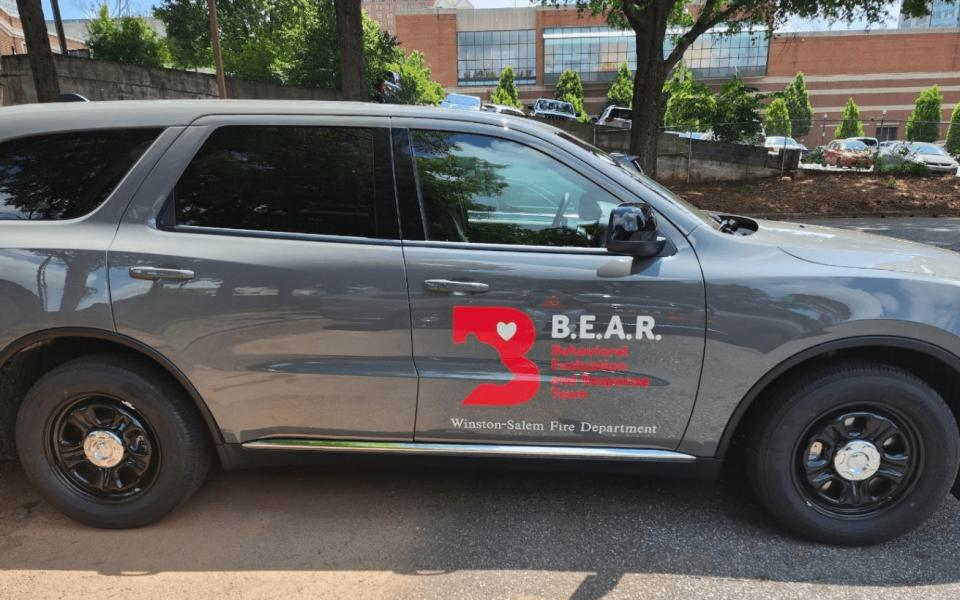Over the years, thousands of families across North Carolina have lost loved ones to opioids. According to the NC Department of Justice, more than 13,169 NC residents died from unintentional opioid overdoses between 1999 and 2017.
Now, Johnson & Johnson and other prescription drug distributors are shelling out $26 billion to settle legal disputes that claim they helped fuel the opioid crisis.
Around $1.37 billion in settlement money will be paid to NC state and local governments — and $35.7 million of that will be disbursed to Forsyth County over a period of 18 years.
Forsyth County is receiving its largest payment, $4,883,351, during the 2023-24 fiscal year.
Some of that funding could go directly to Winston-Salem’s BEAR Team.
In September, Forsyth County asked organizations to apply for opioid settlement funds, which would be used to address the impacts of the opioid epidemic on residents. Funds would be approved by the Forsyth County Board of Commissioners.
The city has requested $532,123 in funding from the county which would add four peer support specialists to the BEAR Team along with four additional vehicles upfitted for the team’s needs, as well as other expenses associated with staffing and vehicles, marketing and communications and client expenses. The BEAR Team is five months into its 1-year pilot program financed through $700,000 of American Rescue Plan Act funding. The team of seven crisis counselors offer an alternative response to law enforcement for 911 calls related to mental health. Between May 15-Aug. 7, the team received 526 calls. The BEAR Team’s Director Kristin Ryan said this equated to 580 hours of crisis intervention time with counselors. Team members went on 132 follow-up responses and spent 343 hours on these follow-ups, with an average response time of 16 minutes and three seconds.
According to the National Institute of Health, patients with a diagnosed mental health condition are more likely to get opioid prescriptions despite their greater risk of addiction and overdose.
According to a 2019 study published by Drug and Alcohol Dependence that used data from the National Survey on Drug Use and Health, more than two million US adults suffered from an opioid use disorder between 2015 and 2017. Using data from 170,300 adults aged 18-64, the study showed that 64.3 percent of them had a co-occurring mental illness, and 26.9 percent had a serious mental illness. However, only 24.5 percent and 29.6 percent of those groups, respectively, reported receiving treatment for their conditions.
During Monday’s public safety committee meeting, committee members recommended the approval of a resolution that would authorize the submission of the funding request application. The resolution now goes to the city council which meets on Oct. 16. In an interview with TCB on Monday, Interim City Manager Patrice Toney said that this additional funding would carry the team “a little bit further.”
“Right now it’s stretched so thin,” she said.
As for what skills the additional four members could bring to the team, Toney said that the “best practice would be a peer support [specialist], a crisis counselor, maybe even a paramedic at some point.”
If someone is simultaneously experiencing a mental health crisis and a drug-related crisis, they would have a “paramedic right there who can treat the patient,” Toney said.
Toney hopes that after the pilot is over, the city will invest in making the team a permanent fixture for the community.
The city is also spending $412,480 of its FY 2022-23 opioid settlement funds on the BEAR Team for the 2023-2024 fiscal year.
All CityBeat reporting content is made possible by a grant from the NC Local News Lab Fund, available to republish for free by any news outlet who cares to use it. Learn More ↗
Republish this storyJoin the First Amendment Society, a membership that goes directly to funding TCB‘s newsroom.
We believe that reporting can save the world.
The TCB First Amendment Society recognizes the vital role of a free, unfettered press with a bundling of local experiences designed to build community, and unique engagements with our newsroom that will help you understand, and shape, local journalism’s critical role in uplifting the people in our cities.
All revenue goes directly into the newsroom as reporters’ salaries and freelance commissions.


It’s great to see efforts being made to address the impact of the opioid epidemic in our community! 💊 The allocation of settlement funds to Winston-Salem’s BEAR Team could really make a difference in providing alternative responses to mental health crises. 🌟 I’m curious about how these additional resources will enhance the team’s ability to support individuals in need and whether this pilot program will become a permanent fixture in our community. 🤔 It’s heartening to see proactive steps being taken to address such important issues! 💪